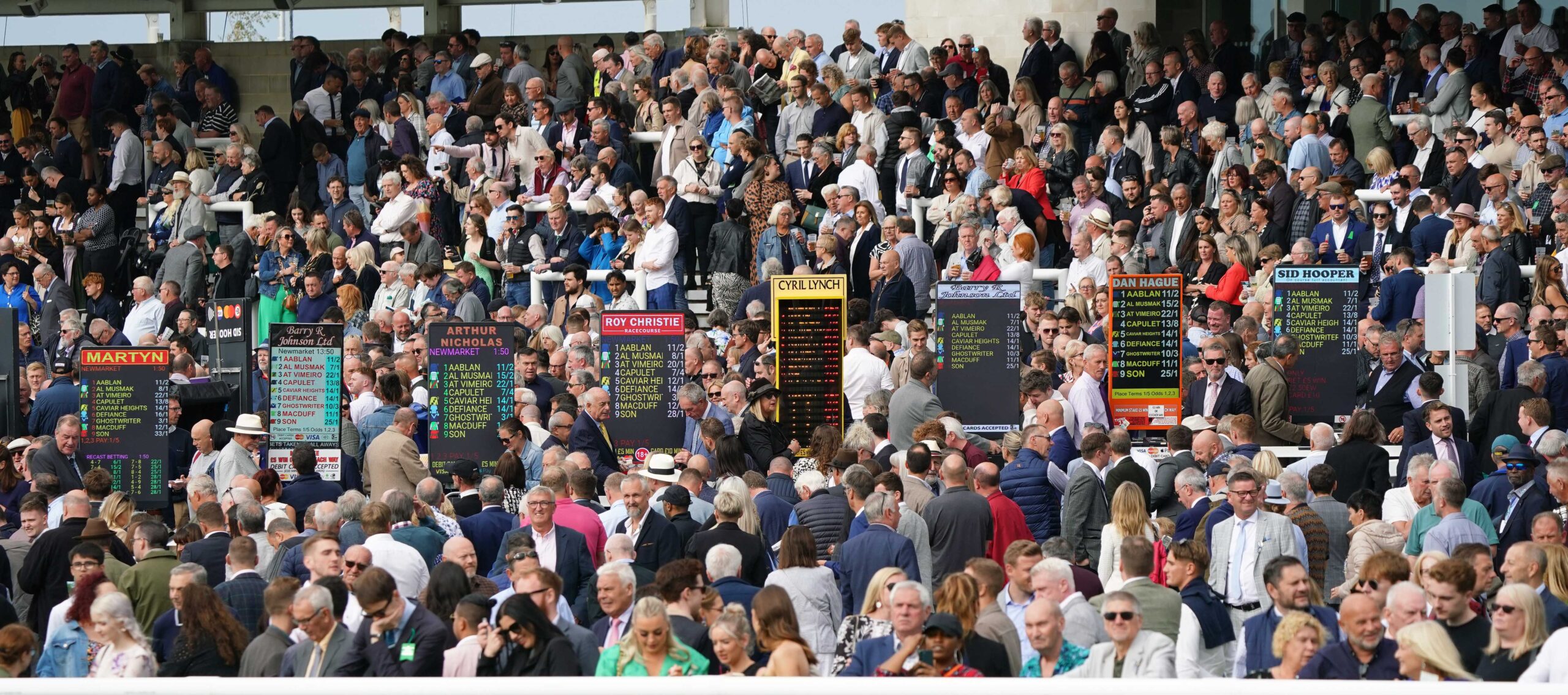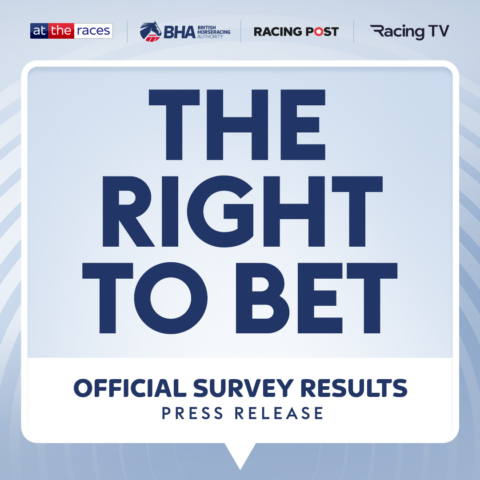

- Racing survey finds more than a quarter of bettors already forced to undergo affordability checks
- More than half will stop betting or bet less if new checks are introduced
- Strong opposition to proposals for intrusive checks following losses as low as £1.36 per day
- One in 10 bettors have used a black-market bookmaker
- Four in 10 are prepared to use the black market if stringent enhanced affordability checks are implemented
- Nine in 10 oppose postcodes or job titles being used to determine ability to bet
More than half of bettors will stop or significantly cut their betting on horseracing if stringent new checks are introduced, a survey has found.
The proposed checks would see bettors having to prove they can afford their hobby if they sustain losses as low as £1.36 per day.
Rather than submit to the checks, respondents to the survey organised by the British Horseracing Authority in conjunction with Racing TV, At The Races and the Racing Post made clear they would turn their backs on the country’s second-largest spectator sport which contributes more than £4bn a year to the British economy.
The aim of the survey was to provide clear and quantifiable evidence of racing fans’ opinions on these proposals that could be shared with the Government and the Gambling Commission. The questions echoed those set out in the Commission’s consultation in a more accessible format and were accompanied by an explanation of what is being proposed. The voices of everyday bettors have often been lost in the debate on affordability checks and the survey has given them a chance to collectively make views known, both to Government and the Gambling Commission.
The proposals consist of two tiers of checks. The first level would test financial vulnerability. “Unintrusive” checks would be conducted when a bettor reaches a £125 net loss within a rolling 30-day period, or £500 within a rolling 365-day period. The checks would use “publicly available data” and look for issues such as bankruptcy orders or a history of unpaid debts. Such checks would not need to be repeated within a 12-month period. The second level assesses financial risk using credit reference data which would be triggered by losses greater than £1,000 within a rolling 24 hours or £2,000 within 90 days. The triggers for such enhanced assessments will be lower for those aged 18 to 24. However, when a credit reference agency is unable to provide sufficient information, operators would need to ask customers for data through open banking or providing documentation. At this tier, checks could take place as often as twice a year.
More than 14,000 people responded to the survey, demonstrating the depth of feeling among bettors and racing fans. The eye-catching results included the fact that even before the new affordability checks are introduced, hundreds of thousands of bettors are already being asked to provide proof they can afford to enjoy their hobby.
If the Government and Gambling Commission proceed with the current plans, 52% of respondents say they would either bet significantly less on horse racing or stop betting on the sport at all. This would have significant negative impact on the racing industry due to a substantial reduction in funding due to a fall in the Horserace Betting Levy.
And despite fears about black-market betting activity being played down by the Gambling Commission, the survey showed that one in 10 bettors is already using illegal providers and four in 10 will consider it if the new checks are introduced.
At the same time, using a bettor’s postcode or job description to potentially determine those ‘at risk’ was opposed by 85% of respondents. Assessing people’s eligibility to place a bet based on their job title or postcode is highly discriminatory and British racing will continue to oppose this proposal.
The results of the survey come as the Gambling Commission’s consultation on remote gambling is set to close on Wednesday 18 October.
Following significant anecdotal evidence, a decision was also taken to ask racing bettors whether they had already experienced affordability checks to build a clear picture of the current situation.
The Gambling Commission has consistently stated that only 3% of betting accounts will be subject to so-called frictionless affordability checks on their online accounts, with just 0.3% encountering the more stringent ‘enhanced spending checks’. However, it is clear that affordability checks have already arrived by stealth for many, and their frequency is far greater than what has been predicted. With 26% of respondents already subject to intrusive checks, the case for reviewing the idea of blanket affordability checks could not be clearer. Over half of the respondents who have been asked to complete an affordability check refused to do so, showing that a huge number of bettors are already voting with their feet and rejecting the process. Instead, measures must be proportionate and targeted at individuals and their specific circumstances. It is our firm view that until the Government has legislated to make changes to gambling regulations and until such time as checks have been subjected to a pilot and are genuinely “frictionless”, that interventions should only be happening in cases where an operator has spotted genuine signs of vulnerability because of tracking an individual bettor’s behaviour.
Affordability is only one potential marker of harm for problem gamblers. Given the fact that millions of people enjoy betting safely each year, questions can legitimately be asked about why the Government and Gambling Commission are seeking to dictate how people choose to spend their money in horseracing in a way that it does not seek to do in any other leisure activity, including playing the National Lottery, purchasing alcohol, cigarettes or fast food, or shopping online.
The current size of the black market has also been consistently underplayed by the Gambling Commission, as well as the potential increase in black market activity if blanket affordability checks are to be implemented. The results of British racing’s survey highlight the impact that affordability checks have already had on driving black market activity, with 9% having used an unregulated bookmaker, while 12% have been approached by one. Any increase in black market activity will have devastating consequences for those with gambling addictions as unregulated betting companies provide no safer gambling tools and are not part of ‘GamStop’.
In addition, the potential cost impact of proposed affordability checks on the sport could result in a 11% reduction in the Levy. The resultant loss of value to media rights deals could see the funding from these reduce by 15%, leading to a reduction of overall funding to racing of millions of pounds.
The British Horseracing Authority will submit a detailed response to the Gambling Commission’s consultation, on behalf of British horseracing, which includes data from the ‘Right to Bet’ survey.
Greg Swift, BHA Director of Communications and Corporate Affairs, said:
“The results of the survey demonstrate a clear rejection by British racing bettors of the measures that are being consulted on by the Gambling Commission. It also demonstrates that for a significant proportion of bettors, affordability checks are already here and impacting on their wholly legitimate hobby. We thank everyone that took the time to complete the survey.”
Martin Stevenson, Racecourse Media Group CEO, said:
“This survey offers the vital voice of the racing punter, who is not being listened to as they should be. It is essential that these illuminating and stark findings from those most affected are properly digested by the Minister, Stuart Andrew MP, and the Gambling Commission. We thank everyone who partook in the survey – we truly believe your voice will be heard.”
Matthew Imi, At The Races CEO, said:
“The Right To Bet survey results offer a very clear indication of the damaging impact which unwarranted affordability checks are already having on racing fans and bettors, and on the sport as a whole. Passionate punters have a key role to play in this debate and we are grateful to those who took the time to share their views.”
Tom Kerr, Racing Post Editor, said:
“The Right To Bet survey results align with what racing fans and punters have been telling us for years. Illiberal and invasive affordability checks are not only deeply unpopular, they are driving bettors towards the black market and away from regulated operators, which will cause untold damage to British racing and fail to achieve the stated aim of increasing protections for punters.”
Notes to editors:
1. Full survey results can be found here.
2. Selected survey quotes:
- “The overall principle of being told what I can spend my money on is abhorrent to me. The levels are frankly ridiculously low for checks e.g £500 a year – £10 a week. High level checks will not be on any use – where I live has a wide spectrum of wealth, I am retired so don’t have a job title and my income will appear low although my wealth is good. I have bet for 40 years it’s my hobby and never had gambling problem. I will not provide any data for checks so I will be excluded from the sport I love – I go racing currently 2-3 times a month, I have shares in a horse, subscribe to Racing TV and Sky and bet regularly. All this will be lost to the industry.”
- “I own a share in a broodmare and her colt yearling. If the opportunity to bet on the foals when they reach racing age is denied to me, since I will not divulge my earnings and savings if requested by a bookmaker, I will hand my share to my trainer and no longer participate in any way in the sport of horse racing. I will do that with massive regret.”
- “As an owner of racehorses if these proposals are implemented I will sell all 15 horses in training and remove myself from the sport. I know I’m not alone with this view amongst owners and racing will face a spiralling decline.”
- “I currently own six racehorses and nobody has questioned my ability to pay for and to keep six horses in training, but the system deems it necessary to request all my financial data to enable me to have a bet on my horses. If my ability to bet on them is removed I will sell them and spend my money on something else.”
- “I work in a job that pays minimum wage, however I look forward to Cheltenham every year and I book this week off work. A few months before Cheltenham I start to put money aside out of my wages to put towards a Cheltenham pot which I can then use over the course of the week to place my bets, therefore I’m able to bet bigger than I do all year round as a result of my saving. I believe these proposals would prevent me from having this enjoyment because I wouldn’t be allowed to deposit/bet this money that I have set aside if I were to have a slow start on day 1 or 2 of the festival with a few losses. I would instantly find myself in a position where I’d be asked to take affordability checks and have my accounts restricted. In all honesty, this would 100% drive me towards the black market to place my bets as a result. The proposals are incredibly out of touch with reality and they will be punishing the working man.”
